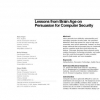5 search results - page 1 / 1 » Exploring Information Asymmetry in Two-Stage Security Games |
NOSSDAV
2005
Springer
13 years 9 months ago
2005
Springer
Cheating in on-line games is a prevalent problem for both game makers and players. The popular real-time strategy game genre is especially vulnerable to cheats, as it is frequentl...
CHI
2009
ACM
14 years 4 months ago
2009
ACM
Users generally have difficulty understanding and managing computer security tasks. We examined Nintendo's Brain Age games for ways to help users remember more secure passwor...
COLCOM
2008
IEEE
13 years 10 months ago
2008
IEEE
Assured information sharing among different organizations in a coalitional environment is an important first step in accomplishing many critical tasks. For example, different secur...
GAMESEC
2010
13 years 2 months ago
2010
The combination of username and password is widely used as a human authentication mechanism on the Web. Despite this universal adoption and despite their long tradition, password s...
MICRO
2008
IEEE
13 years 10 months ago
2008
IEEE
Any architectural optimization aims at satisfying the end user. However, modern architectures execute with little to no knowledge about the individual user. If architectures could...

